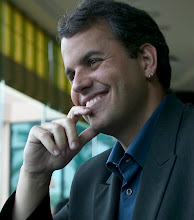This was an exciting week at USC for two reasons. I held my first faculty seminar and our class had two great guests. The faculty seminar was Annenberg Dean Ernest Wilson's idea. Since I was going to be down at Annenberg anyway, why not pull together a group of faculty and grad students to dig into where virtual worlds are, identity areas that need further research, explore how the lessons from Second Life could be applied to Annenberg, and generally bounce ideas between a pack of smart, opinionated people. I gave the first talk yesterday and I've posted my slides here on Slide Share.
It was a successful kick-off meeting and it clarified logical topics for the next several sessions, with full days needed on:
- Usage and behavior in virtual worlds/mmos
- Legal and regulatory issues for virtual worlds
- Education
- National security and public diplomacy
- Connections between virtual worlds, games, and social networks
For the class, we were joined by Sue Cross and Sarah Nordgren from the Associated Press. Sue is their VP Online and is responsible for all the online services for the AP, including the many news sites that publish AP stories. It was a lively and candid discussion that focused on the impact of citizen journalism, the general painful trends impacted the newspaper business, and in particular how those trends have impacted the AP. I think the AP is in a very interesting position. While newspapers have been diving for the hyperlocal markets in an attempt to be more relevant than broader online sources -- more on that in a moment -- AP attempts to provide a worldwide news bureau that is able to source stories for any paper in the world. Imagine trying to write stories about Iraq that both the Washington Post and Washington Times would publish? And they do this with a relatively small staff. They've also seen an increasing demand for their international coverage as even major papers have continued to cut their newsrooms.
The hyperlocal focus of papers is going to be tough as the web really gears up in this area. Yelp is already well established with Yellowpages.com leveraging its brand as well. In addition, one of the students pointed out Everyblock, which is neat. How cool was it to see the health inspection report of my favorite restaurant in San Francisco? However, while attempting to find the listing again, now I can't find it. So negative points for missing obvious search options.
The students also spent time examining three small sites/communities, Kingdom of Loathing, xkcd, and magnatune. All three demonstrate that you don't need to start big to create a thriving and interesting place on the web, although there were nits. This week, students will be looking into virtual worlds and games. Any bets on which worlds and games get the most time? Which ones install correctly for the most students? Generate the most comments in their reflection papers?



No comments:
Post a Comment